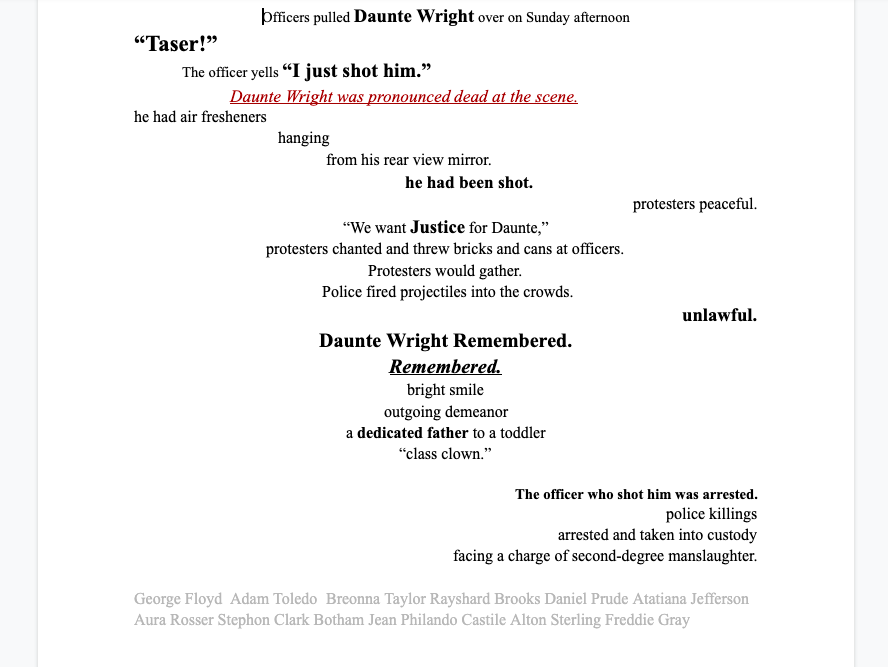Lindsey Branigan
In Myriam Gurba’s memoir Mean, Gurba writes about her journey through girlhood and womanhood and the violence and abuse that may sadly come along with it. Gurba describes herself as a queer Mexican woman, and growing up as a queer Mexican woman has made her into the person she is today. Throughout this memoir, there are traumatic events that happen such as sexual abuse and assault, racism, and misogyny, and Gurba uses her dark sense of humor to deal with these events. Along with her dark sense of humor, Gurba also uses metaphors, such as her usage of the term “ghosts.”
Throughout this memoir, Gurba mentions “ghosts” and death many times. The first time we read about ghosts is when Gurba is mentioning guilt. On page 3 after reading the story of Sophia, Gurba writes, “Sophia is always with me. She haunts me. Guilt is a ghost” (Gurba 3). Gurba writes this because guilt is not something we can see much like ghosts, but guilt is something that is carried with us or, like Gurba states, ‘haunts us.’ Nevertheless, it is not the last time we hear about it. The ghosts in this memoir are carried with Gurba, and end up aligning with her experiences with sexual abuse when she is in her history class in high school. Gurba describes an experience with her classmate, who she calls Macaulay. Gurba writes about the molestation, “You can’t see Macaulay on me, but you can read him. He treated me like an artist working with dirt” (Gurba 32). Macaulay in this instance is another ghost of Gurba’s past, one that molested her and left an “invisible imprint” (Gurba 32) on her When Gurba is in junior high, she describes an event that happened when she was drinking with her friends and was caught by the police, but was let go. “I was allowed to escape. I was allowed to walk away from that spot. Sophia was not. Guilt is a ghost. Guilt interrupts narratives. It does so impolitely. Ghosts have no etiquette…” (Gurba 55). In this instance, Gurba feels guilty that she was able to escape a situation when Sophia was not. Gurba was out, having a fun night with her friends, and was let go by the police officer. The thought of Sophia not being able to escape shrouded her mind and subconscious so much that it “interrupted her narrative so impolitely.” Myriam Gurba also had a sister, Ofelia. Ofelia dealt with Anorexia that consumed her as eating disorders do their hosts. Ofelia had to live at the hospital at one point, which Gurba wrote down and described how their home felt. Gurba writes, “When Ofelia went to live at the hospital, she became even more of a ghost” (Gurba 53). Gurba writes this because although her sister is absent, she can still feel her presence in the home. She can still feel her around (like the guilt she carries every day) even though she cannot physically see her or be with her.
Alongside ghosts, Gurba is intentional with her use of language. Whether it be her use of dark humor or the way she strategically places poems in the text, it is intentional. An example of her intentional use of language would be on page 71 when she is talking about her abuelita’s death. She writes, “Death does have a gender. She likes to flirt” (Gurba 71). Gurba writes this sentence and gives death the ‘she’ pronoun to go against the presumed gender roles and misogyny that have been constantly placed on her, her friends, and many inanimate things in life. When you think of death or the Grim Reaper, you typically think of a masculine figure that carries a sythe. Gurba saying ‘she’ breaks down those sterotypical gender normalities placed on everyday things.
Discussion Questions:
1.) What do you think the purpose of Gurba writing about guilt on page 55 was? Explain. Are there any other important examples of ghosts in the text that Gurba mentioned?
2.) Why do you think Gurba presumed death as “she,” and not “he,” or “it?” Do you think she did this on purpose? Why or why not?
Work Cited
Gurba, Myriam. Mean. Coffee House Press, 2017.

